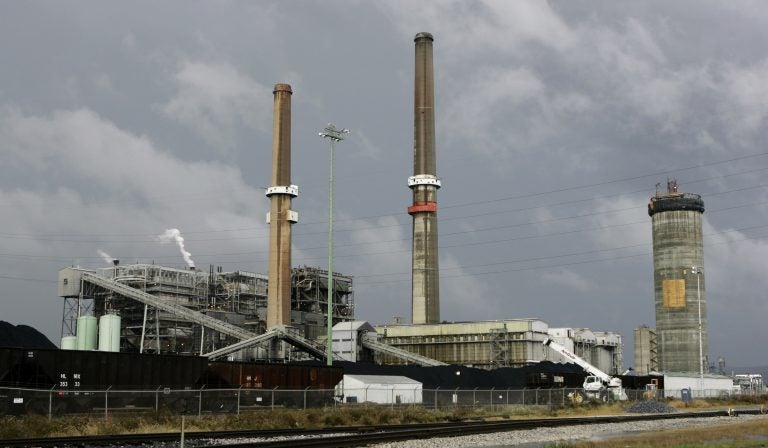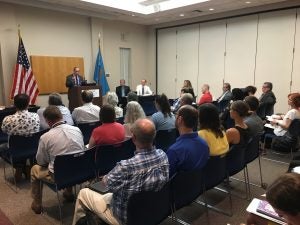Delaware protests EPA decision on air pollution
State leaders and residents spoke out against the EPA’s denial of Delaware’s petition to reduce air pollution coming into Delaware from other states.

PPL's Brunner Island is a three-unit, coal-fired plant located on the west bank of the Susquehanna River, is seen in York Haven, Pa. (Carolyn Kaster/AP Photo)
Because of Delaware’s geography, the state’s air quality is impacted in large part on air pollution that is blown into Delaware from other states. Pollution from those upwind states has long been a point of contention. In 2013, the state joined seven other Northeast and Mid-Atlantic states in petitioning the EPA to reduce emissions in nine upwind states — Illinois, Indiana, Kentucky, Michigan, North Carolina, Ohio, Tennessee, Virginia and West Virginia.
“Delaware’s air quality ranks among the worst in the country,” said Shawn Garvin who heads the Delaware Department of Natural Resources and Environmental Control. “The real kicker though is that 90 percent of that pollution comes from other states.”
The Clean Air Act addresses pollution that travels from state to state in what’s referred to as the “Good Neighbor Provision.” That clause permits downwind states to petition the EPA for relief from pollution created in another state.
As with the 2013 petition, Delaware filed another petition in 2016, pointing to the Harrison Power Station, the Homer City Generating Station, and the Brunner Island Steam Generating Station in Pennsylvania and in Conemaugh Generating Station in West Virginia as sources of pollution that were causing elevated levels of ozone in the First State.
“We don’t like it, we’re out of [air quality] compliance, [but] it ain’t our fault,” said U.S. Sen. Tom Carper of Delaware. “How would the folks in Pennsylvania like it if 94 percent of their pollution came from other states and they couldn’t get any relief? How would they like it?” Carper asked.
In June, the EPA denied Delaware’s petition against the power plants and held a public hearing on the denial just 15 days later in Washington, D.C. Garvin was displeased with both the denial and the short timeframe with which the hearing was set. “Delaware companies have spent the money and cleaned up their emissions, other states have not,” Garvin said. “If we do nothing else as government, it seems to me that ensuring our citizens have clean air to breathe should be the minimum standard.”

On Monday, Garvin held a hearing to gather comments from residents as the state continues its fight to overturn the EPA’s proposed denial of its petition against the out of state power plants. “Air doesn’t respect our state lines, and our lungs don’t process pollution differently depending upon what state it comes from,” said Debbie Heaton at the hearing at Delaware Technical and Community College in Stanton.
All who spoke at the hearing opposed the EPA decision. “EPA has got to try harder to come up with better solutions to resolve these difficulties if the agency is going to deny legitimate petitions,” said Pat Todd. Others, like Coralie Pryde accused the EPA of abandoning its stated mission to protect human health and the environment. “By delaying and denying any meaningful actions on Delaware’s 126(b) petitions, the EPA is refusing to protect the health of Delawareans,” Pryde said. “This needs to be changed.”
Senator Carper of Delaware is the ranking Democrat on the Senate Environmental and Public Works Committee. Last week, he talked about Delaware’s petitions briefly with interim EPA Administrator Andrew Wheeler. “He’s brand new in this position, he probably feels most days like he’s drinking out of a firehose,” said Carper of Wheeler’s effort to get up to speed since taking over from scandal-plagued Scott Pruitt earlier this month. “I just want to make sure that one of those firehoses is from Delaware.”
Garvin said the state will keep pressing the EPA to hold upwind source accountable for emissions that impact Delaware’s air quality. “For the time being, Delawareans will continue to suffer as we enter this hot summer season,” Garvin said. He plans to work with Delaware Attorney General Matt Denn to force the EPA to enforce the Clean Air Act. Carper also said he plans to work in Congress to overturn the EPA’s decision. The comments taken in Monday’s hearing will be a part of that appeal process.
WHYY is your source for fact-based, in-depth journalism and information. As a nonprofit organization, we rely on financial support from readers like you. Please give today.





